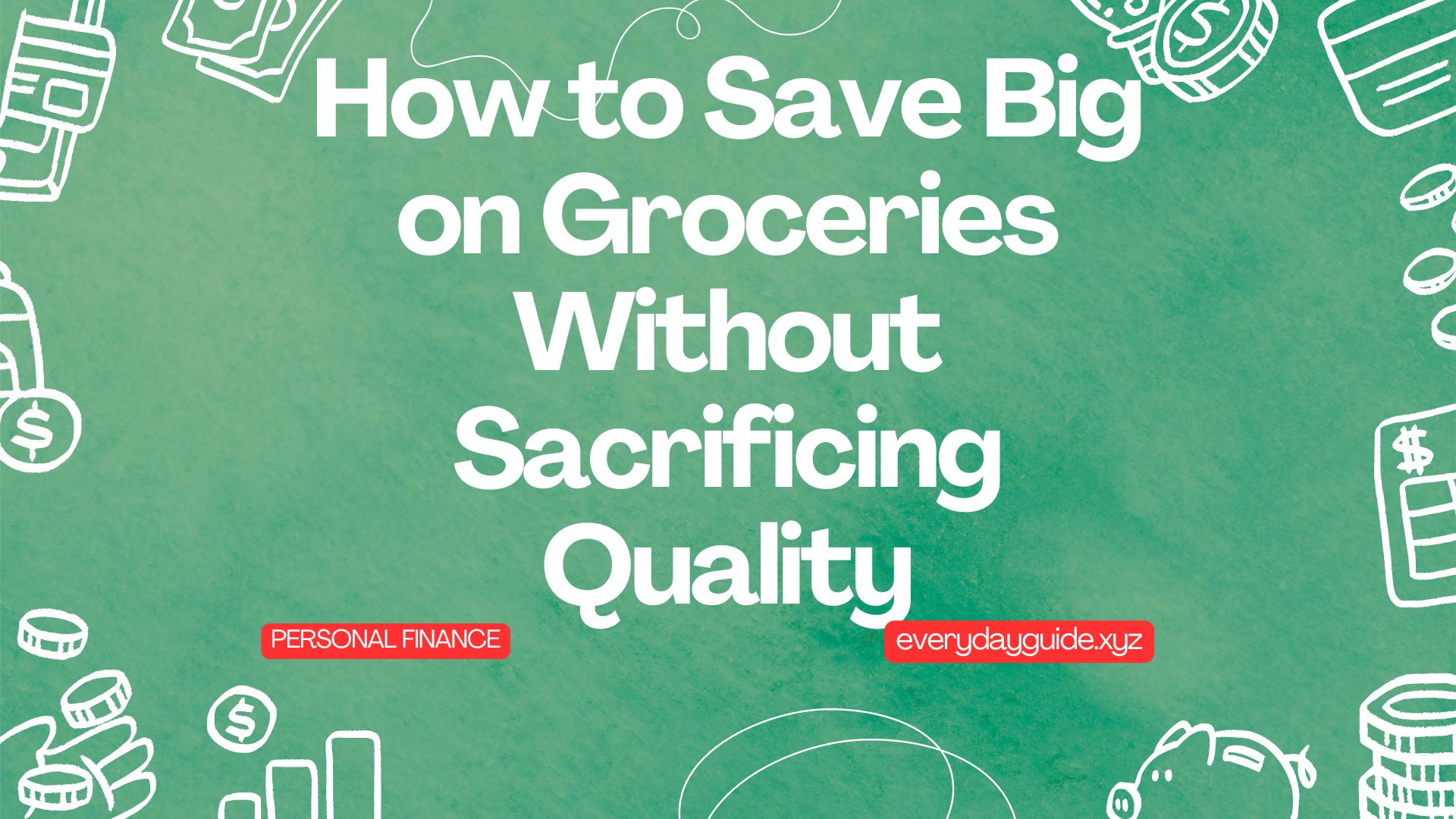One of the most basic expenses that you need to have a grip over is your grocery bill, which takes a large amount of your paycheck and with inflating price rise, has made it near impossible to stay within budget. That being said, you can still save a ton of money when it comes to food without feeling like your trading down in taste. Since the cost of food isn’t going down anytime soon, you might as well learn some smart shopping strategies and use every last tool at your disposal to stretch that grocery budget as far as possible while still eating fresh, healthy meals your family will love, right?
Buy Well: Plan your meals
If you really want to save some money on groceries, I suggest always plan out your meals ahead of time. Plan Your Meals – Meal planning is the most important thing you can do to avoid impulse buys and only buy what you really need. OK, starters from a meal planning novice!
Plan Meals Around Sale Items
Weekly sales and discounts in grocery stores. But you can honestly just save money on that by checking all the flyers or using a couple couponing apps before you make your meal plan. For example, if you find this great sale on chicken go ahead and meal plan three or so meals using that chicken for the week. By meal planning around sale items, you can stretch your savings and still use the best ingredients.
Make a Detailed Shopping List

Plan your meals for the week, and then create a detailed shopping list based on what ingredients you’ll actually need. List the exact amount you need to avoid overbuying. Following this list during your shopping trip will keep you from buying unnecessary items and save you from meandering through aisles as well, which can lead to impulse buys.
Buy in Bulk Wisely
Buying in bulk is one of those money-saving tips, and while that advice remains timeless, you have got to be smart about how you buy in bulk. Large scale purchases are not always the cheapest option, so you might even find yourself wasting money in the long run; as some of these edible goods have a shelf life and will expire if you don´t consumer it first.
Concentrate on the Long-Lived and Freezer-Friendly Items

Opt for nonperishables like rice, pasta, canned beans and flour or things that come frozen-veggies, meats and breads. In this way, you have a better product that has a long consumption period and is your resource even during the time when you need to hold inventories for weeks or months so that they do not spoil. You can store those items in your pantry or freezer if you have space and buy them on sale EN-masse thus saving a lot of money with time.
Compare Unit Prices
You can not simply assume that because they come in larger packages, that makes them the cheaper option all of the time. The easiest way to compare the worth of bulk items is looking at unit prices. Nearly all stores put a unit price on the shelf tag, and it should tell you how much an ounce, pound or liter costs. For larger sizes, compare the price per serving to what you would pay for a smaller box or bottle to be certain that you are actually saving your money.
Choose store brands and generic alternatives
Many store brands and generic products are of equal quality to name brand items, but at a fraction of the price. In reality, most store-brand products are manufactured at the same factories as the name-brand versions.
Taste Tests for Quality
If you are nervous to start buying store brands, then do blind taste tests of something that everyone loves and regularly buys (pasta or cereal or canned vegetables for example). Some you might even find to be as good or better as their pricier name-brand counterparts. You can however, save money without compromising taste or nutrition by slowly mixing in generic alternatives to your grocery routine.
Focus on Essentials
Most products such as flour, sugar, cooking oil and paper goods are really great products for a store-brand swap. Cost wise, since these items are not that different from one brand to the next, choosing a cheaper variety adds up over time. Just be sure you verify the ingredients because it could change the quality.
Purchase Food in Season from Local Sources

Purchasing fruits and vegetables that are in season is one key to spending less money on groceries without skimping on quality. They are not only much cheaper but also fresher, so they taste better.
Advantages of seasonal Fruits & Vegetables
In other words, it’s cheap as there is a lot of produce available in-season. For example, strawberries are cheaper if you buy them during the summer (when they’re in season) than if you were to attempt to buy them in winter from regions that aren’t local. It also usually contains more nutrients because produce is harvested at its ripest.
Buy and Shop at a Farmers Market for Local Farmers
Local farmers markets can be an amazing way to get fresh, high quality produce for lower prices than most large supermarket chains. When you buy directly from farmers instead of using middlemen who make things cost more, not only do YOU become to save money but you also get to support your local economy. Some farmers may also give you a discount on bulk purchase or his last few hours of the market day when he will want to sell the produce remaining at his stand.
Coupons and Cash Back Apps
Saving money on groceries while still getting high-quality food is something that almost everyone in America wants and can be accomplished with the help of coupons and cash-back apps.
Utilize Digital Coupons and Loyalty Programs
Almost all supermarkets these days have introduced digital coupons on their respective websites or mobile apps. Loyalty programs: Joining a store loyalty program generally entitles you to discounts and individualized deals stemming from your particular purchases. Pair these savings with sales and promos for even greater deals.
Leverage Cash-Back Apps
You receive free money from cash-back apps like Ibotta, Checkout 51, and Rakuten when you buy a qualifying item at a participating store. Securities offered through LPL Financial, Member FINRA/SIPC; Investment advice offered through Gerber Kawasaki Inc (GKI), a registered investment advisor and separate entity from LPL Financial. Over time, those rewards can really add up and net you even more in savings at the grocery store!
Also Read More:
- The Best Productivity Apps You Might Not Know About Yet
 In the fast-paced digital world of today, productivity has become even more important. So, while Trello, Asana and Evernote are common household names for productivity apps there is still a goldmine of them lesser-known that can totally transform your workflow. This… Read more: The Best Productivity Apps You Might Not Know About Yet
In the fast-paced digital world of today, productivity has become even more important. So, while Trello, Asana and Evernote are common household names for productivity apps there is still a goldmine of them lesser-known that can totally transform your workflow. This… Read more: The Best Productivity Apps You Might Not Know About Yet - How to Set Reminders That Actually Help You Stay on Task
 Our world is moving fast and it can be difficult to stay organized with the many tasks we have at any given time. We are overworked, and with so many things competing for our attention almost daily it is easy to… Read more: How to Set Reminders That Actually Help You Stay on Task
Our world is moving fast and it can be difficult to stay organized with the many tasks we have at any given time. We are overworked, and with so many things competing for our attention almost daily it is easy to… Read more: How to Set Reminders That Actually Help You Stay on Task - Simple Ways to Use Your Smartphone Calendar Like a Pro
 In the fast-paced world of technology, being well-versed in your smartphone calendar is so important for keeping life under control and getting things done. Busy professional working long hours, student juggling between academia and part-time jobs or just someone who wants… Read more: Simple Ways to Use Your Smartphone Calendar Like a Pro
In the fast-paced world of technology, being well-versed in your smartphone calendar is so important for keeping life under control and getting things done. Busy professional working long hours, student juggling between academia and part-time jobs or just someone who wants… Read more: Simple Ways to Use Your Smartphone Calendar Like a Pro - 5 Quick Ways to Cut Down on Distractions from Your Phone
 Our smartphones have become both our best friends and our worst enemies in the hyperconnected world of today. Sure, they provide us with an unprecedented level of convenience and connectivity — but they also double as endless wells of distraction, pulling… Read more: 5 Quick Ways to Cut Down on Distractions from Your Phone
Our smartphones have become both our best friends and our worst enemies in the hyperconnected world of today. Sure, they provide us with an unprecedented level of convenience and connectivity — but they also double as endless wells of distraction, pulling… Read more: 5 Quick Ways to Cut Down on Distractions from Your Phone - Turn Your Phone into a Powerful Study Tool with These Tips
 In this age of digitalisation, smartphones are so ubiquitous that we tend to overlook their power as a study tool. This extensive guide will take you through creative hacks to supercharge your phone and make it an irreplaceable academic assistant. From… Read more: Turn Your Phone into a Powerful Study Tool with These Tips
In this age of digitalisation, smartphones are so ubiquitous that we tend to overlook their power as a study tool. This extensive guide will take you through creative hacks to supercharge your phone and make it an irreplaceable academic assistant. From… Read more: Turn Your Phone into a Powerful Study Tool with These Tips
Do Not Waste: How to Properly Store Groceries
The larges drivers of high grocery bills is food waste. Proper storage can help keep your food fresher, longer and prevent waste.
Organise Your Fridge and Pantry
Keeping a clean and organized fridge and pantry can help you prevent those foods from going bad before you get the chance to use them. Put the older items at the front (If organised this way, you are likely to use before they expire,) and put newer behind them. Purchase some airtight containers to prolong the life of dry goods such as flour, pasta and cereal.
Freeze Food Properly
Freeze: Freezing is one of the most effective tools for extending the shelf life of perishable foods. Freeze meat, bread and even dairy products like cheese for another day. Ensure you wrap the items securely to avoid freezer burn, and then label them with the date as a reference on when to eat. Freeze leftovers, or you can make double and freeze half in individual portions to save money as well as time.
Shop at discount groceries
Aldi, Lidl and Trader Joe’s are a few of the discount grocery stores that provide high-quality products at affordable prices. They keep prices low with their private label brands and cost-saving tactics like smaller stores and no frills. By purchasing items from discount stores, you’ll be able to minimize your time at the grocery store and maintain high-quality products without busting a hole in an already thin wallet.
Perimeter Shopping
Typically discount grocery stores are set up just like other larger grocery stores with fresh produce, meats, dairy and bakery items lining the perimeter. Spend most of your shopping in these sections to guarantee the fresh, real food you are buying comes at a discounted rate.
Buy More During Promotional Offers
Keep an eye out for Special Promotions and Weekly Deals at Discount Grocery Stores. And be aware that some stores actually offer overstock items or produce that’s in season for deep discounts, even if it is reaching its expiration date. This things that are on sale, if they’re non-perishable and you stock up on them with the promotion, you can save more money.
Conclusion: How to Shop More Sustainably and Save Money Over the Long Run
The key to learning how to save big on groceries is using common sense and having an understanding of what are healthy foods versus just extravagant items. You can slash your grocery bill by planning meals around sales, buying in bulk, choosing store brands and making use of coupons and apps—all while still feeding your family tasty and nutritious food. To minimize wastage, store your food well and try to consume from the agricultural season. Using these methods, you can eat healthy and food options without breaking the piggy bank.

